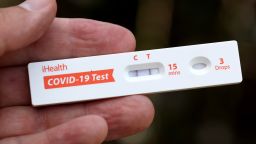Newly updated vaccines against Covid-19 will be in pharmacies soon, just as the US is experiencing a surge of infections. But is it a good idea to get in line for a new shot pronto, or should you wait a few weeks to get optimal protection against a possible winter wave?
Experts say it depends on your health, whether you’ve recently had Covid-19, which vaccine you plan to get and when it’s convenient for you.
“It’s not a straight answer, quite frankly,” said Dr. Carlos del Rio, a distinguished professor of medicine at Emory University and expert on infectious disease.
“We’re in the midst of a of a huge wave. Many people, including yours truly, have recently had Covid,” he said.
For that reason, he’s going to hold off on getting the updated shot.
“If you had it in the last three months, I would wait. There’s no need to get a vaccine, because you have, in a way. You’ve been ‘vaccinated’ by the by the current strain,” he said.
On the other hand, if you haven’t recently had Covid, and especially if you’re 65 or older, “I would get it as soon as possible,” Del Rio said. The same is true for people with underlying health conditions that put them at higher risk for serious outcomes of a Covid infection.
Just who are the people at highest risk of hospitalization or death??Dr. Paul Offit, director of the Vaccine Education Center at Children’s Hospital of Philadelphia and a member of the US Food and Drug Administration’s vaccine advisory committee, says people who are getting really sick with Covid mostly fall into four groups.
“One is people who are immune-compromised; two, people who are who have medical conditions that put them at high risk, like obesity, diabetes and chronic liver, lung or heart disease. I think three are pregnant people, and four are what I now reluctantly describe as the elderly,” whom Offit categorizes as people over 75.
Offit and other experts say that otherwise younger and healthier adults are fine to bide their time. In fact, it may be smart to do that, since the boost to frontline immunity that the vaccine provides fades within a few months.?Waiting until the fall ensures that you’ll be better protected during respiratory virus season, which tends to peak in December and January.
“If you haven’t been recently infected, the new boosters matter a lot,” said Dr. Megan Ranney,?dean of the Yale School of Public Health. “The current variants of Covid differ substantially from last winter’s variants, and this year’s boosters are matched to the new variants.”
She agrees that older adults and people with underlying health conditions who haven’t recently been infected should get in line for their shots now, but she’s going to delay hers a bit.
“I am planning to wait until the same time as I get my flu shot, sometime in October,”?she said.
Ranney noted that the?updated?mRNA shots from Pfizer and Moderna will?probably?be available first, with Novavax’s vaccine?coming in a few weeks.
“If you are nervous about mRNA for some reason?–?although these vaccines are very safe?– the Novavax booster, which is protein-based, will soon be available, too,” she said.
Dr. Peter Chin-Hong, an infectious disease expert at the University of California at San Francisco, is?also?waiting a few weeks.
“I’m definitely not going to run out and get a shot.?I’m more worried about winter than the summer,”?he?said.
But a golden rule of vaccination is?“know thyself,”?he said.?If you’re somebody who is likely to get distracted and busy and forget to get a shot, any?time that works for you is the best time.
“This is a general principle: If it’s convenient for people and they may not get a shot later in the year, any shot is better than no shot,” Chin-Hong said.?“I think for me, I kind of like to get everything in at the same time. So I get flu and?Covid at the same time. It kind of minimizes trips.”
Get CNN Health's weekly newsletter
- Sign up here to get The Results Are In with Dr. Sanjay Gupta every Tuesday from the CNN Health team.
Ideally, people wouldn’t have to try to figure out the best timing for a single shot when there are multiple waves of Covid each year, said Dr. Peter Hotez, an infectious disease expert and director of vaccine development at Texas Children’s Hospital.
“The reality is that we’ve had waves of?Covid every summer for the last few years,?and so I think we have to kind of do a reset or rethink about how we’re doing?Covid vaccine delivery,” Hotez said.
“Given the fact that the mRNA vaccines are not very durable?–?not as durable as we’d like?–?we should be doing twice-a-year vaccination,”?he?said. “And then the question is, do the companies have the bandwidth to make more than one vaccine every year??…?And so that’s going to be the next set of questions.”



